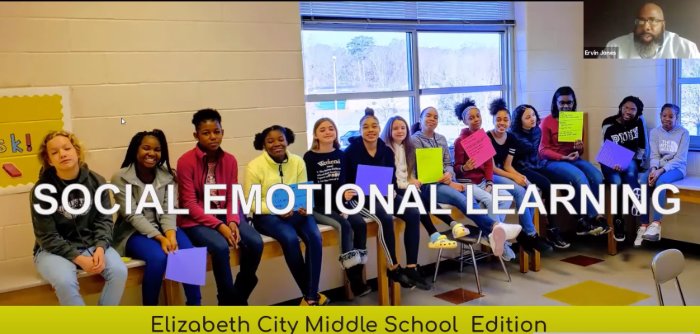By: Stacey Craig Riberdy, NC Resilience & Learning Project Consultant
Elizabeth City Middle School, home of the yellow jackets, is just northwest of Elizabeth City, not far from the Pasquotank River as it winds inland from the Albemarle Sound. The Public School Forum’s Resilience and Learning Project began supporting trauma-informed work at ECMS in the fall of 2019. Since then, their teachers and staff have adopted a school-wide approach to Social and Emotional Learning, integrating it into their existing restorative approaches to discipline, and into their support mechanisms for staff wellness and self-care.
Beginning the 2020-21 school year like many schools across the state, ECMS has been adapting their SEL practices to remote learning during this pandemic. All ECMS students begin their day virtually (or in-person for some), with 15 minutes of SEL through checking-in and relationship building with their teacher and peers. The Collaborative for Academic, Social and Emotional Learning (CASEL) defines SEL as “the process through which children and adults understand and manage emotions, set and achieve positive goals, feel and show empathy for others, establish and maintain positive relationships, and make responsible decisions.” Last year, ECMS adopted the Choose Love Curriculum to offer weekly SEL instruction and skill building for students, and to embed SEL throughout the school day. This year they have begun with Choose Love’s “Brave New World” Back-to-School Unit.
Staff receive SEL support and training too, taking time weekly on “Fantastic Fridays” for community building, self-care, and professional development. Mr. Ervin Jones, the SEL Coordinator and Restorative Coach at ECMS, has seen the adoption of school-wide SEL as a great success. “The teachers are asking for more [SEL support],” he says.
Mr. Jones describes the school as being intensely focused on building strong, positive relationships with and around each and every student, knowing that this is the key to “unlocking” student learning – for academic achievement and for life. The school’s view and approach to discipline is part of this same strategy.
A cornerstone of ECMS’ discipline approach is known as “The Hive,” a morning reflection and accountability circle facilitated by Mr. Jones, where students referred for discipline concerns (in lieu of in-school-suspensions or ISS) learn skills for reflection, conflict resolution, restitution and repair. “The Hive” also helps students transition back into their classroom in a restorative way, as students demonstrate their readiness for self-management and taking part in the classroom environment.
“The Hive” still runs virtually. And when a student shows behaviors which can’t be addressed within the classroom environment, that student is provided a virtual conference with Mr. Jones for extra communication, support and accountability. With these practices, ECMS is seeking to make SEL a seemless part of the school culture, building relationships through care and accountability for staff and students by regularly practicing SEL and then providing extra support to students who need help applying these concepts and skills.
ECMS summarizes their approach to discipline and accountability through the acronym “CAN,” which stands for Communication, Accountability, and No Nonsense. The school uses this shared language to help define for students and staff the importance of 1) open, clear and respectful two-way communication of needs and expectations, 2) accountability for listening and finding solutions which meet the needs of all, and 3) holding firm to the importance of follow-through — with any abdication of one’s role in the solution being called out as “nonsense.” In this way, the school seeks to hold high standards for everyone’s behavior within the context of respectful, understanding and transparent relationships and processes.
Mr. Jones has been seeing a positive reaction from students to this approach. “They call it ‘the 100,’” he says, noting how much the students appreciate being both openly listened to and held accountable for upholding the values of the school. He sees the way SEL and a restorative approach to discipline go hand-in-hand to help build trust with the students, helping them feel understood and respected, and that they matter.
He also sees that it’s uncomfortable and difficult work for the students (and adults!) to communicate honestly about their feelings and to solve conflicts. Instead of feeling further disconnected and excluded following a suspension, students tend to leave “The Hive” with greater understanding of themselves and others, and greater skills for being successful in the school environment. “They get healing instead of just another scar,” Mr. Jones says of the restorative approach versus suspension.
Ms. Delisha Moore, the principal, has seen a great impact from this restorative approach as well. “Restorative circles is a HUGE part of our discipline model. This includes students, parents, and staff. This really brings people together to teach them about empathy and how their behavior impacts others and the environment. Restorative circles have changed how we discipline students,” she says.
ECMS continues to expand its approach to helping students connect with others, with learning and with their own ability to succeed. Staff have learned that in order to be accountable for their actions, students need to develop the skills to manage their emotions so that they can be intentional about their behavior. The explicit teaching of regulation skills is a newer and growing component of what students and staff are learning and applying at ECMS. Mr. Jones is converting his office into a calming space, and is now looking into embedding emotion regulation into school-wide SEL with Zones of Regulation and complementary strategies.

